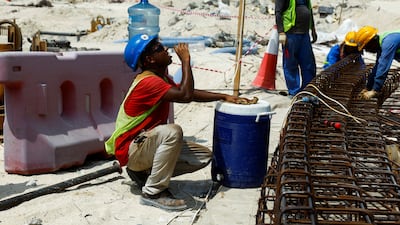It is no surprise to anyone in the UAE at this time of year that it gets hot outside. For those who work indoors, the country’s modern and widespread air conditioning systems take the edge off the summer months. As recently explored in The National, such infrastructure has helped turn the Emirates from a place where summer temperatures were almost unbearable to one that can be enjoyed year-round.
But for the thousands of people whose jobs take them outside during the heat – construction workers, delivery drivers and gardeners, for example – searing temperatures and high humidity are so challenging that there have been legal regulations in place for years to help protect them. These rules ban outdoors work from 12.30pm until 3pm in the summer months and require employers to provide staff with a shaded place to rest during their breaks. Daily working hours – for morning, evening or both shifts – must not exceed eight hours.
The fact that enforcement spot-checks this year have uncovered nearly 50 companies breaking these rules is an indictment of some businesses’ willingness to cut corners while adopting a cavalier attitude to the health and well-being of their staff. Companies caught breaking the rules will face fines of Dh5,000 ($1,360) for each worker, reaching a maximum of Dh50,000.

Although most employers act responsibly – last year, the Ministry of Human Resources and Emiratisation said it conducted almost 55,200 inspection visits across the country and found 99 per cent compliance – those who put profit before staff well-being should face the full rigours of the law.
Unfortunately, some of the workers concerned often lack knowledge about their legal rights or are too intimidated to demand them, making them more vulnerable to unscrupulous employers. To that end, the ministry carried out 17,000 visits to companies in the first six months of 2022 to make clear their legal obligations. It also held workshops and distributed brochures to companies and labour accommodation centres, educating workers about their entitlements.
Although government regulations are a necessary minimum standard, the onus is on companies to look closer at their working practices during the summer. They ought to endeavour to adhere to these regulations and go above and beyond the minimum requirements on midday breaks and shade. Although some jobs require outside work in summer – delivery drivers, for example – many more are adaptable. For example, a great deal of construction and roadworks now take place after sunset during the summer months, reducing the harm posed by high temperatures and sun exposure.
Other companies have taken welcome steps to invest in their employees’ well-being – last month, Abu Dhabi’s Joint Committee for Traffic Safety joined forces with the Ministry of Human Resources and Emiratisation and food delivery company Talabat to provide solar-powered, air-conditioned rest areas for delivery riders.
Nevertheless, the summer in climates such as this region's will always pose a considerable challenge to workers. A combination of evolving legislation, strict enforcement and companies ensuring they take all necessary measures to protect their staff are essential to reducing the intensity of that challenge and keeping as many workers as safe as possible.


